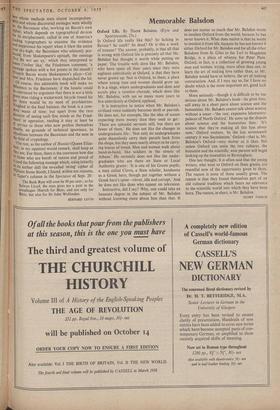Memorable Balsdon
Is Oxford life really like this? So lacking in flavour? So small? So dead? Or is this a work of treason? The answer, probably, is that all that is wrong with Oxford life is precisely all that Mr. Balsdon has thought it worth while putting on paper. The trouble with dons like Mr. Balsdon, who have spent all their years since they were eighteen unbrokenly at Oxford, is that they have never grown up. Nor is Oxford, to them, a place where young men and women should grow up. It is a stage, where undergraduates and dons and scouts play a timeless charade, which dons like Mr. Balsdon, with yet so many more years to live unbrokenly at Oxford, applaud.
It is instructive to notice when Mr. Balsdon's civilised voice suddenly becomes shrill or peevish. He does not, for example, like the idea of scouts expecting more money than they used to get : 'There are splendid servants still, but there are fewer of them.' He does not like the changes in undergraduate life : 'Not only do undergraduates quite shamelessly carry their parcels back from the shops, but they seem nearly always to be carry- ing loaves of bread. Men and women walk about hand-in-hand, like soldiers in the streets of Athens.' He certainly does not like the under- graduates who are there on State or Local Authority grants : 'It is one of his Greats pupils, a man called Clovis, a State scholar, handsome as a Greek hero, though put together without a Greek hero's spine—clever, idle and corrupt.' And he does not like dons who appear on television.
Instructive, did I say? Why, one could take an honours degree in the subject of Mr. Balsdon without knowing more about him than that. It does not matter so much that Mr. Balsdon wants to insulate Oxford from the world, because he has never known it. What does matter is that he wants to insulate it from life, because he has not known it either. Oxford for Mr. Balsdon and for all the other Balsdons from St. Giles to the Turl to %Magdalen Bridge, is a place of whimsy for Peter Pans. Oxford, in fact, is a collection of growing young men and women, trying, more often than not, to learn the art of making love rather than, as Mr. Balsdon would have us believe, the art of making conversation. And, if I may say so, for I have no doubt which is the more important art, good luck to them.
More seriously—though it is difficult to be too serious about Mr. Balsdon's book—he gives him- self away in a short piece about science and the humanities. Mr. Balsdon cannot talk about science without a sneer—`the vast, expensive laboratory- palaces of North Oxford.' He sums up the dispute about science and the humanities thus : 'It's science that they're making all this fuss about now,' Oxford mutters. 'In the late seventeenth century it was Socinianism.' Oxford—that is, Mr. Balsdon's Oxford—may mutter as it likes. But unless Oxford can unite the two cultures, the humanist and the scientific, wise parents will begin looking up the timetables to Birmingham.
One last thought. It is often said that the young writers, who went to Oxford on State grants, are resentful now of the opportunity given to them. The reason is none of those usually given. The reason is that they found themselves part of an old cultural tradition which bears no relevance to the scientific world into which they have been born. The reason, in short, is Mr. Balsdon.
liENRY FAIRLIE






















































 Previous page
Previous page